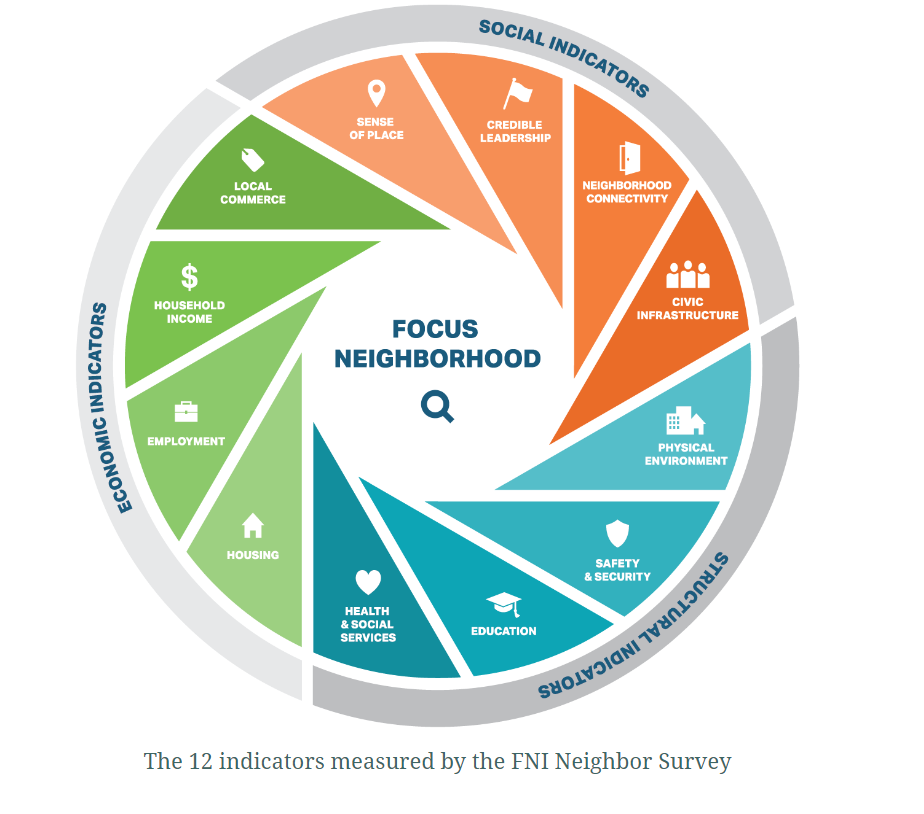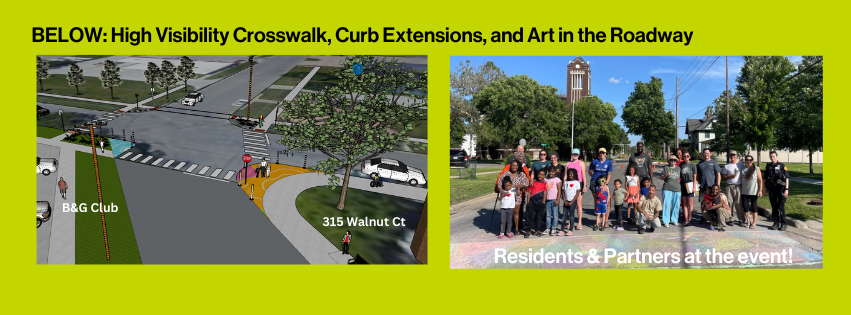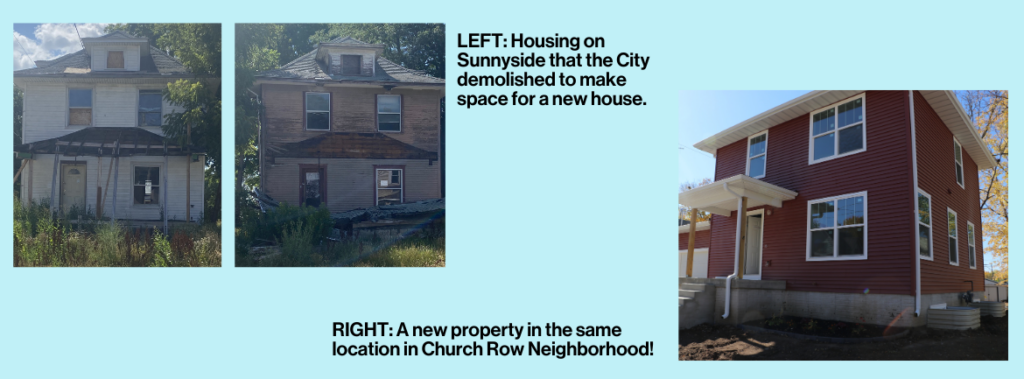
March 27, 2025
The Flourishing Neighborhood Index & 2 Success Stories of Action Teams
The Flourishing Neighborhood Index (FNI) is a system for helping neighborhoods grow and change while highlighting holistic aspects of well-being including social, economic, and structural indicators of neighborhood development. The FNI was originally developed by Focused Community Strategies (FCS), the consulting arm of the Lupton Center based in Atlanta, GA.
Along with residents and partners, Iowa Heartland Habitat staff implemented the FNI in two Waterloo neighborhoods starting in 2021. From 2021-2022, FCS consultants guided us through our first Assessment phase, followed by the Alignment phase in early 2023 and launching the Activation phase in July 2023, which has been continuing in these neighborhoods, as we have not yet completed all of the great goals that the Action Teams have set!
Measuring community growth and indicators of well-being are essential to knowing the trajectory of progress in a neighborhood. The FNI Assessment phase includes data collection and analysis using multiple tools: a mapping survey, neighbor survey, and Census tract data. The mapping survey allows volunteers to capture data about the physical structures by filling out questions related to every parcel of land in the neighborhood boundaries. The neighbor survey gathers information directly from neighbors about their experiences of living in the neighborhood and builds relationships as we connect over the stories they share. These two surveys, coupled with Census data, helps the Assessment phase produce a clear picture of neighborhood life at the time, which FCS then helps us understand in order to share back with the community and take action to focus our efforts where neighbors are saying change is most needed.
The first year of FNI Action Teams in Church Row and Walnut Neighborhoods launched in July 2023-June 2024 with a one-year commitment to see change happen by setting and achieving strategic goals, and most teams have continued with commitments through June 2025. I'd like to highlight the importance of the Action Teams by sharing: (1) how they were established, (2) a few stories of the Neighborhood Action Team successes, (3) challenges and obstacles, (4) what's next for Action Teams, and (5) how to get involved.
Neighborhood Action Teams: The Driving Force
When assisting with the launch of neighborhood Action Teams, I created some guidelines that would hopefully start the teams on a good trajectory. One key element was that we would not plan to launch an Action Team unless two neighbors were available and invested in working on the goals in their neighborhood through this process. Over time, we have seen resident interests and commitments shift. Some teams now have 4 or 5 residents attending regularly, while others have one strong resident leader consistently involved. At the end of the day, what matters to me most is that residents are represented at minimum by at least one or two of their neighbors to help guide the decisions that are being made and provide updates to other residents as needed.
Some other guideline requests that I put into place when launching the action teams included the following:
- A commitment to meet monthly from all team members or send a proxy.
- Partners signed a commitment, which included the goal to listen to residents' concerns and dreams.
- Residents often took on leadership roles in identifying a location for the meetings or recording team notes.
- Team meeting agendas included a question to foster connection in addition to the targeted goals.
After the first year of meeting, what we saw in one team was that no residents were interested in continuing the Action Team for a second year starting in July 2024. I saw this as an opportunity to listen and respond to what was happening with the team; it was no problem for that Action Team to dissolve. Some of the activities that this action team initiated are still making an impact today, and for that I think many people are grateful. I'm excited to highlight two Action Team successes below!
Success Stories of Teams in Action
Case Study #1: Addressing safety concerns in the Walnut and E 3rd Street corridor.
Action Team members wrote a Speed Bump Petition with the goal to help decrease speeding on Walnut Street, but the City of Waterloo denied the request. Then, community partners offered alternative solutions for increasing safety, as well as beautification, through implementing a temporary asphalt art demonstration. The team accomplished a trial run at the Chalk the Block for a Safer Street event in June 2024!

Case Study #2: New housing benefits Church Row Neighborhood.
A key focus area identified by the Church Row Housing & Physical Environment Action Team right away in July 2023 was on the 200 block of Sunnyside Avenue. The City of Waterloo was able to get these two houses demolished through their 657a process, which then allowed a Habitat homeowner's new construction to be built and purchased on the same site in November 2024.

Challenges and Obstacles
Neighborhood Action Teams have faced some common hurdles, such as seeing a drop-off in team attendance and a resulting difficulty with getting goals accomplished.
Strategies for overcoming these challenges include following up with folks right away after the meeting to see why they couldn't attend, offering different meeting times, and directly asking about goal progress even if someone did not make it to the meeting.
From these setbacks, we have together learned some valuable lessons, mainly that it's up to team members to be flexible but also persistent in order to achieve the Action Team's collective goals.
Future Directions
FNI Action Teams have been working hard for two years to move the needle on initiatives in their neighborhoods. In order to continue getting a pulse on neighborhood flourishing, we do plan to pause some of these team meetings in order to re-evaluate what the broader neighborhood is thinking and feeling about its progress through another round of surveying. This will allow teams to confirm the direction of their work, invite more voices to provide input, and perhaps expand the involvement of residents who are not yet connected to the work.
How to Get Involved
If you are a resident in Church Row or Walnut Neighborhood, we always welcome more residents to learn about the Action Teams and engage at whatever level works for you. Please reach out to me at my email address (jpetersen@webuildhabitat.org) if you would like to know the current Action Team meeting days and times, or any other questions you may have. You can also reach me at my neighborhood cell phone number by texting or calling 319-240-2857.
I am also happy to provide resources and support to partner organizations, churches, and individuals who are curious about joining with residents in their work. I can be reached at the same contact listed above if you would like to see how you might contribute as a partner!

